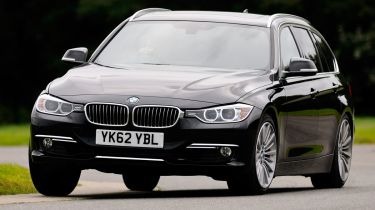BMW 330d Touring
Can BMW add practicality to desirability with its new estate?
Given the brilliance of the 3 Series saloon, it’s no surprise to find that the new Touring version has jumped straight to the top of the class. The 330d is fast, great to drive, roomy and cost-effective to run – this hugely talented estate is the ultimate all-rounder.
BMW has a surprisingly long history of compact estate models, with the first 3 Series Touring making its debut 25 years ago. While it has never been the most spacious wagon money can buy, the desirable BMW has always delivered sharp handling, strong straight-line performance and top-notch build quality.
Now, this latest fifth-generation Touring promises to finally match the best in the class for practicality, while retaining the engaging dynamics and classy kerb appeal of its predecessor. So, has it done enough to take the plaudits here?
Well, it certainly looks the part. BMW’s designers have done an excellent job of grafting an upright estate rear end on to the 3 Series saloon. In fact, to our eyes the well proportioned Touring looks even more handsome and upmarket than the slightly mundane four-door version. Our range-topping Luxury test car was given a visual boost courtesy of its eye-catching 18-inch wheels and extra chrome trim.
Used - available now

2022 BMW
3 Series
53,629 milesAutomaticPetrol2.0L
Cash £17,516
2020 BMW
3 Series
53,657 milesAutomaticPetrol2.0L
Cash £16,500
2022 BMW
3 Series
32,380 milesAutomaticDiesel2.0L
Cash £26,900
2022 BMW
3 Series
54,828 milesAutomaticPetrol2.0L
Cash £17,687All versions get BMW’s trademark opening boot glass, which allows you to easily drop small items into the boot, while the Luxury has a powered tailgate, too. With the seats in place, the BMW provides a useful 495-litre carrying capacity, and folding the 40:20:40 rear bench flat liberates 1,500 litres of space – enough to rival the Mercedes C-Class Estate.
Although the 3 Series lacks the Audi’s optional sliding load-securing kit, it does benefit from several securing eyes, shopping bag hooks, a 12v power supply and a handy underfloor storage compartment. There’s also a retractable load cover that automatically lifts out of the way to aid access to the boot.
Elsewhere in the cabin, there’s little to separate our three contenders for practicality. Those sitting in the back of the BMW get a decent amount of head and legroom – although the transmission tunnel means foot space is a little restricted if you’re the middle seat passenger.
Up front, there’s plenty of space to lounge about in, plus loads of seat adjustment to ensure the driver will easily be able to find a comfortable seating position. And as with the 3 Series saloon, interior quality is first rate. All the materials have an upmarket look and feel, while the fit and finish is easily a match for the Audi.
The wraparound dashboard is slickly styled and logically laid out, plus the controls and switches operate with the sort of precision you would expect of a high-end luxury car.
There’s also loads of equipment fitted as standard, including leather upholstery, climate control, rear parking sensors, Bluetooth and USB connectivity.
Unfortunately, some key desirable items like xenon headlamps, satellite navigation and heated seats are relegated to the expensive – and extensive – options list.
Yet while the BMW doesn’t get many of the gadgets you’d expect to find in a £40,000 car, it certainly isn’t short of performance. The smooth 255bhp 3.0-litre straight-six doesn’t have as much torque as the C-Class’ engine, but that didn’t stop the 330d blasting from 0-60mph in just 5.8 seconds – a tenth faster than even the four-wheel-drive Audi. And thanks to a slick eight-speed automatic transmission, the 3 Series extended its advantage in our in-gear tests. Yet what’s really impressive is that this blistering pace is combined with a remarkable 40.4mpg.
As you’d expect, the BMW led the way away from the track, too, where the engaging rear-wheel-drive chassis and beautifully weighted controls make it the keen driver’s choice. Our car also benefitted from the £750 Adaptive Sport Suspension, which allows you to choose Sport+, Sport, Comfort and EcoPro modes.
In the raciest setting, the 3 Series Touring gets sharper, weightier steering, faster throttle response and firmer dampers, while selecting Comfort allows the car to effortlessly smooth out bumpy roads. Yet despite a remarkably supple ride, the refinement suffers as it generates more wind and road noise than the Mercedes.
Still, this is one of the few chinks in the BMW’s armour. It matches the best in the class for space, plus it boasts remarkably low CO2 emissions of 135g/km, strong residuals and a great-value pre-paid servicing pack. Factor in excellent fuel returns and sparkling driving dynamics, and the 3 Series is looking a strong contender for victory.







